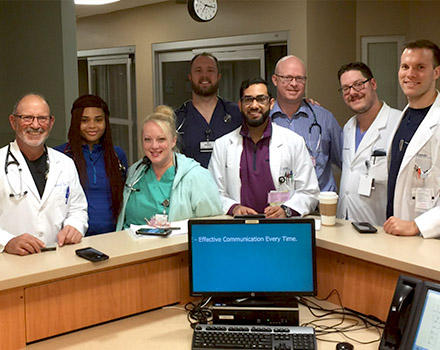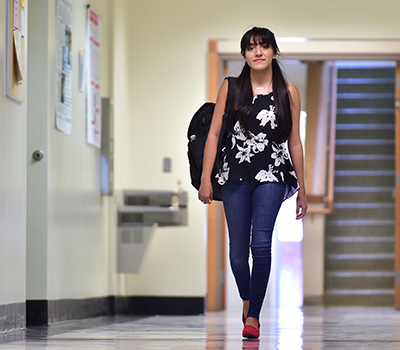Let’s Invest in Student Well-Being
By Thomas M. Evans, PhD
As we approach the one-year milestone of living with a global pandemic, it might be worthwhile to step back, however briefly, for some perspective. How have we grown or changed during this extraordinary year? What lessons or insights have we gained during these weeks and months living outside of ordinary time?
In my role as university president, my thoughts always begin with students. Here at the University of the Incarnate Word, we gather such a range of diverse people, backgrounds, ages and career stages into one community. I am sure that the variety of challenges met by students during this year mirror that diversity. No two pandemic experiences, we can assume, look exactly alike.
As I write this post, thousands of elderly, those at-risk, and other residents of San Antonio and South Texas will continue to make their way toward vaccine distribution sites. The public health tide, we pray, has begun to turn toward peace of mind and healing.
Five Elements of Well-Being
One of my hopes for our future as an institution and faith community centers around student health and well-being. While we gave that concern plenty of attention pre-pandemic, we know now that the matter of student well-being carries even more importance going forward.
Various global reports, surveys and studies name five essential elements of well-being: career well-being, financial well-being, social well-being, physical well-being and community well-being. A deadly and highly contagious virus has put each element to the test.
Career and Financial Well-Being
Today, more than ever, many current and prospective college students live right at the edge of this question: “is college worth it?”
A group of economists from the New York Fed have studied and tracked this fundamental question for nearly a decade, and report “the average rate of return for a bachelor’s degree has edged down slightly in recent years due to rising costs, but remains high at around 14 percent, easily surpassing the threshold for a good investment.”
Many other studies affirm that a college degree supports stronger incomes, less risk of job loss, improved community stability, civic participation, home ownership and yes, better health outcomes. A novel coronavirus has reminded us that any measure of health must apply across demographic contexts.
Again, context matters. The cost of college attendance represents about 15 percent of total income for higher-earning families, but nearly 85 percent of the average family income for the lower-earning households. While some lower-income students persist, the financial burden and hurdles eventually take a toll. Low-income students remain five times (5x) less likely to graduate four-year college by age 24. Early data shows that first-generation freshman have been hardest hit by the pandemic, resulting in their pursuit of a degree being deferred or abandoned.
We continue to make the case to donors and governments that we can do more to protect student well-being by increasing our endowment and ability to offer reliable scholarships and other forms of aid. Lowering the debt burden for students remains a high priority — and the community has responded.
Social, Physical and Community Well Being
 UIW’s dual ministries — education and healthcare — take on even greater importance in the face of a pandemic. Consider the role that our School of Osteopathic Medicine has played, close to home and in the Rio Grande Valley.
UIW’s dual ministries — education and healthcare — take on even greater importance in the face of a pandemic. Consider the role that our School of Osteopathic Medicine has played, close to home and in the Rio Grande Valley.
Thanks to a new $10.8 million state grant, UIW will expand the School of Osteopathic Medicine’s internal medicine residency program, currently operating in Laredo through a partnership with the Laredo Medical Center, to San Antonio, where the 15 new residents (internal medicine, family medicine, and psychiatry) will be stationed.
Launched in July 2018, the Laredo programs represent the city’s first-ever Graduate Medical Education programs. A new class of residents joined the inaugural class this summer —with three Laredoans among the second cohort. Also joining the work are eight, third-year UIW medical students who will be performing their clinical rotations at LMC.
The need is clear.
- Texas ranks 47th among 50 states in the ratio of primary-care doctors per person — a shortage that’s even more pronounced in underserved areas of South Texas.
- Life expectancy in Bexar County varies by as much as 20 years depending on wealth and access to care, and seven Texas cities rank in the top 50 in America for life expectancy gaps by income. Texans living in rural areas (15 percent of the total) have lower incomes and insurance rates, less access to primary care, and poorer education and health outcomes.
Calling UIW Students to the Edge of Their Longing
I came upon this insight from a long-time foundation officer in my research into campus-based well-being initiatives.
“Over the years, when I visit college campuses, I often get the sense that students are somehow not fully alive,” observes Susan Kassouf, a program officer at the private Endeavor Foundation. “The amazing energies inherent in young adults are somehow not reached by the curriculum or the faculty, that in all of our talk about ‘core’ curricula we are still not reaching students at their core. I wonder if perhaps we are working with a flattened notion of a human being, or the human condition, or only approach human beings within a very narrow range of what may actually be an extraordinarily expansive, multi-dimensional continuum, a continuum that includes flourishing and perishing as essential aspects of our humanity.”
With that challenge in mind, I revisited some of the extraordinary students from our Class of 2020 — young women and men who responded to unexpected obstacles with the kind of “extraordinarily expansive” resolve that Kassouf imagines.
 Take Class of 2020 Math and Biochemistry graduate Ixtaccihuatl Obregon. First recognized by the National Science Foundation as a San Antonio Math Scholar, four years later Ixtaccihuatl became one of 10 students in the nation to qualify for the National Institutes of Health (NIH) Undergraduate Scholarship Program. The reward includes paid research training at the NIH during the summer, and a guaranteed position as an NIH researcher after graduation. Surrounded by friends when she received the NIH email, Obregon exhaled a long, slow, deep breath of excitement and relief. “Guys,” she called out to her friends. “I got it.”
Take Class of 2020 Math and Biochemistry graduate Ixtaccihuatl Obregon. First recognized by the National Science Foundation as a San Antonio Math Scholar, four years later Ixtaccihuatl became one of 10 students in the nation to qualify for the National Institutes of Health (NIH) Undergraduate Scholarship Program. The reward includes paid research training at the NIH during the summer, and a guaranteed position as an NIH researcher after graduation. Surrounded by friends when she received the NIH email, Obregon exhaled a long, slow, deep breath of excitement and relief. “Guys,” she called out to her friends. “I got it.”
Ixtaccihuatl paid her excitement forward to her good friend Erica M. Ruiz, a senior majoring in Biology with a concentration in Neuroscience and a Psychology minor. Erica was celebrating her acceptance to McGovern Medical School. “I feel so blessed to have this opportunity,” she said. “Houston, here I come.”
And from Ixtaccihuatl and Erica, we meet Mahek Khwaja, also a senior majoring in Biology just accepted into the Doctor of Pharmacy Program at UIW Feik School of Pharmacy for Fall 2021. Mahek plans on pursuing UIW’s dual degree program — adding a Masters of Arts in Administration with a concentration in Healthcare Administration to her PharmD. “I feel very blessed and excited to have this opportunity,” she said, “and would like to thank my parents for their unconditional sacrifices.”
I reflect on these amazing young people and their accomplishments and vow that as a community, we must invest in the whole person and reach more and more students at their core.

